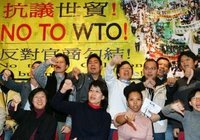Protests at WTO Meetings
 Violent Protests marred the first day of the World Trade Organization meeting in Hong Kong today. As World Trade Organization (WTO) members held their opening ceremony, two policemen were slightly injured along with seven protesters. Disagreement over agriculture remains the main stumbling block, with most sides blaming the European Union (EU). The EU is accused of not doing enough to cut farm subsidies and tariffs. Developing countries want richer nations such as the EU and US to lower both subsidies for their own farmers and tariffs on imported foods.
Violent Protests marred the first day of the World Trade Organization meeting in Hong Kong today. As World Trade Organization (WTO) members held their opening ceremony, two policemen were slightly injured along with seven protesters. Disagreement over agriculture remains the main stumbling block, with most sides blaming the European Union (EU). The EU is accused of not doing enough to cut farm subsidies and tariffs. Developing countries want richer nations such as the EU and US to lower both subsidies for their own farmers and tariffs on imported foods. While the EU has been singled out for refusing to make sufficient concessions, it has said it can go no further.
Critics of the event feel that nothing constructive will come out of it. While some protesters managed to break into the main conference centre, others - mainly South Korean farmers - tried to swim across Hong Kong harbour to the event.
According to www.gatt.org, Six developing nations have lodged a complaint against the US, calling the Iraq War "history's biggest illegal trade subsidy" and "market distortion on a gargantuan scale." "In a free market, companies like Halliburton and Exxon should be funding their own market expansion projects instead of depending on their government for help," said a spokesperson for the consortium.
The US requested renewal of the so-called peace clause, which gives countries immunity from challenge at the WTO, in October this year. The EU said in a press briefing today – the opening day of the WTO Ministerial in Hong Kong – that the peace clause was a ‘key principle of the trade round’ but Oxfam said that its renewal would allow rich countries to continue paying illegal and harmful subsidies.
Phil Bloomer, Head of Oxfam International’s Make Trade Fair campaign said: “It would be outrageous if the peace clause were renewed. The EU and US say their subsidies are not illegal and do not distort trade, but if they are not doing anything wrong then why do they need to seek immunity from challenge? The message this sends to the world is ‘Let’s agree new trade rules, and then just keep on breaking them’.”
Last month Oxfam released a report showing that the EU and US could face challenges from developing countries on $13 billion of illegal agricultural subsidies, including rice, corn and tomatoes. Since the peace clause expired in January 2005, Brazil has won cases against the EU and US on sugar and cotton respectively. Despite the EU’s claims to the contrary, Oxfam said that recent Common Agricultural Policy (CAP) reforms would not end the damage being done by dumping to developing countries.
Also discussed today at the WTO meeting were possible increases of targeted aid to help developing countries trade. Following an announcement of an extra 2bn euros from European Finance Ministers in Brussels last night, negotiators at the WTO meeting discussed how the aid could be delivered and the US indicated that it would be announcing further aid for trade package later in the week.
“No development package would be good enough to guarantee developing countries gain from these talks," said Bloomer. "Unless rich countries radically shift their approach, agree to further cut their harmful subsidies and tariffs, and afford developing countries protection from forced liberalization, there can be no pro-development outcome.”


0 Comments:
Post a Comment
<< Home